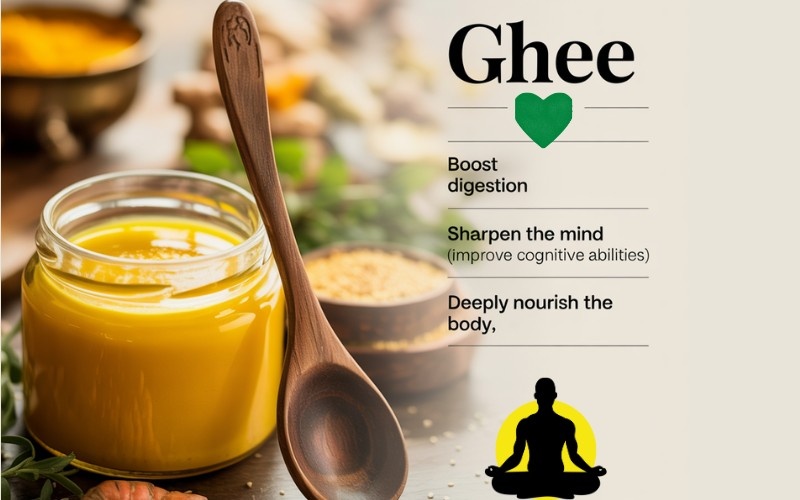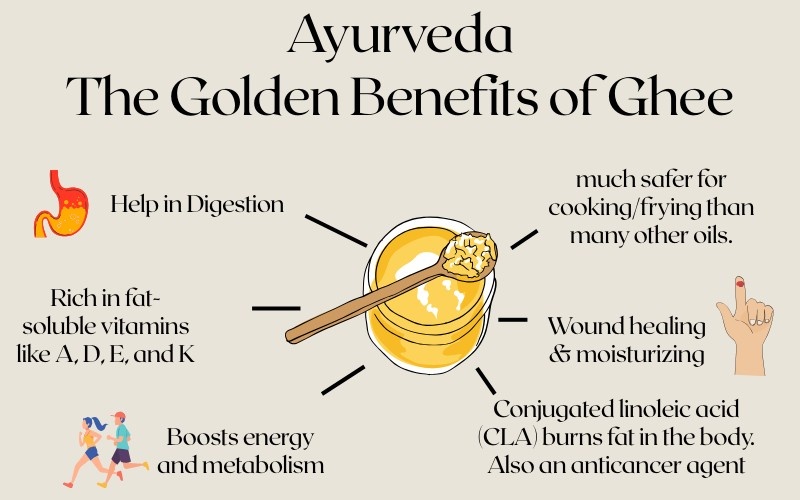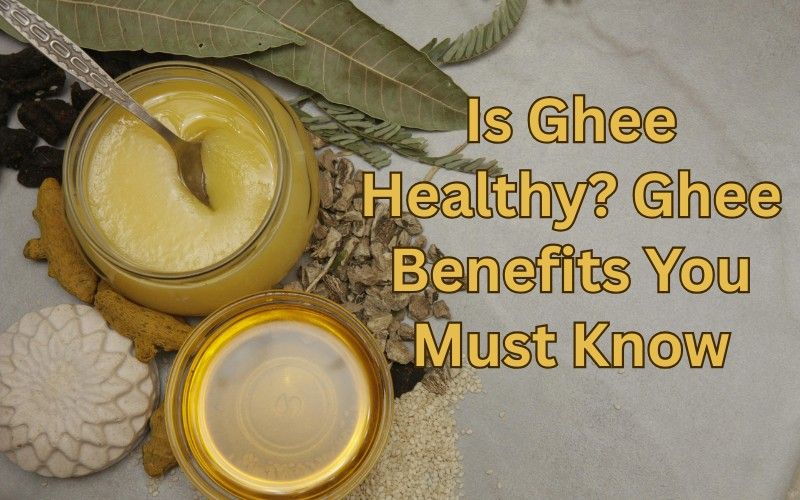For centuries, ghee has had a special place in Indian kitchens. It is praised in Ayurveda as a source of strength, nourishment, and cognitive benefits. But today, it has become one of the most debated foods. While some families still use ghee daily, others avoid it, as they fear weight gain, cholesterol, and heart issues. Westernization has labelled it as “unhealthy fat,” but is that the whole truth?
Let’s clarify whether ghee is healthy with science-backed facts and explore the real ghee benefits.
Ghee: A Therapeutic on Its Own

Ghee, the clarified butter obtained from milk, is considered very healthy and a complete food in Ayurveda. It is one of the most important ingredients of the traditional Ayurvedic medicine system called the materia medica.
Modern research looks at ghee mostly for its health, skin care, and wound healing properties. However, Ayurveda highlights other ghee benefits — its power to boost digestion, sharpen the mind (improving cognitive abilities), and deeply nourish the body.
Is Ghee Good For Health?
Yes! When enjoyed in moderation, ghee can be a very healthy addition to your diet. Contrary to people saying “all fats are bad,” ghee is rich in short-chain fatty acids, vitamins, and conjugated linoleic acids (CLA) [helps in fat metabolism].
There is one research where they reviewed the ghee benefits with both Ayurveda and modern science perception. They found that when animals were fed ghee (up to 10% of their diet), it did not worsen cholesterol levels, and in many cases, it actually improved them. On ghee consumption, the body mechanism to flush out cholesterol via bile increased in these animals.
They also noted that ghee did not boost the harmful oxidation of lipid in the liver. This lipid oxidation is damaging to heart health. In short, moderate ghee consumption showed hypocholesterolemic effects. Meaning it has cholesterol-lowering properties when taken in moderation everyday.
A spoonful of ghee a day is unlikely to hurt your heart and actually supports digestion, improves immunity, and overall wellness. But the key is balance! Overconsumption can still lead to weight gain and then cholesterol issues.
What is Lipid Oxidation In The Liver and How Does it Cause Heart Problems?
So normally, what happens is liver processes the fat from our diet. In this process, it either stores them in the form of fatty acids or repackages them in the lipoprotein form (LDL, HDL, VLDL) to transport them into the blood.
So the fat stored in the form of fatty acids inside the liver undergoes beta-oxidation, and energy is produced.
However, when our diet contains excess fat, high sugar, and alcohol, not all fatty acids are properly metabolized. They undergo a harmful chemical reaction that produces harmful substances. These substances then damage our DNA, proteins, and cells in the body.
On the other hand, the normal LDL, which is produced to transport into the blood, is healthy, and our body needs it. But with excess fat in the body, the normal LDL is converted into harmful LDL by an oxidation reaction.
As it is harmful, our immune cells eat this harmful LDL. But they are unable to destroy it, so these immune cells with harmful LDL in them are called foam cells. These foam cells pile up in the arteries and narrow the passage of the arteries over time. Due to this piling up, the blood flow reduces and leads to heart problems.
How Ghee Fits Into This Picture?
Here’s the interesting part — research shows that moderate consumption of ghee doesn’t trigger this harmful lipid oxidation process to happen in the liver.
Instead, ghee may actually help the body flush out the excess cholesterol through bile. This keeps LDL from turning bad or harmful.
What are The Top Benefits of Ghee?
Here are 8 key ghee benefits simplified straight from an article published in 2018 in the Nutrition Journal named Health Benefits, Properties, and Importance of Ghee:

- Ghee has a high smoke point (~250 °C), so it’s much safer for cooking/frying than many other oils.
- Stable shelf life. Ghee has very low moisture, as almost all water gets burned during the making process. And it has natural antioxidants; these two properties help ghee stay good without refrigeration.
- Good for digestion. Ghee has short-chain fatty acids like butyric acid, which helps in good gut health and reduces inflammation.
- Rich in fat-soluble vitamins like A, D, E, and K, plus essential fatty acids, which our body can’t make, like linolenic, arachidonic acids.
- Boosts energy and metabolism. The medium-chain fatty acids in ghee are burned by the liver quickly. This makes ghee good for athletes as it gives a steady energy source.
- Ghee also contains a good amount of CLA (conjugated linoleic acid), which is a reported anti-cancer agent.
- Wound healing and skin benefits. Ghee has moisturizing and anti-aging properties.
- It is also gentle for people with dairy sensitivity. As milk solids are removed during the making process, lactose-intolerant people tolerate ghee better.
Who Should Avoid or Limit Ghee?
The only concern with ghee is the cholesterol level, it has 0.2–0.4%. Which can contribute to the cholesterol problem when consumed at high levels. In recent years, people have become extra concerned about their health. That is why people have completely boycotted ghee, which is wrong.
For the right ghee benefits, you must not consume high levels of ghee. However, a spoonful every day has great health benefits for your overall well-being.
But who should completely avoid ghee?
People with heart disease (blockage in arteries), high cholesterol, and obesity should avoid eating ghee. And people with diabetes and BP should limit their intake.
Conclusion
Modern science is now finally catching up with what Ayurveda has known for thousands of years — ghee is healthy, but in moderation. Packed with rare nutrients, vitamins, and healthy fats, ghee doesn’t just fuel your body, but nourishes it from the inside out. The main part is off-course balance! Too much of anything can tip the scale the wrong way. Even superfoods can lose their magic if overused.
So, what’s your take — is ghee a must-have in your home, or do you avoid it? Let me know in the comments!




Post Comment